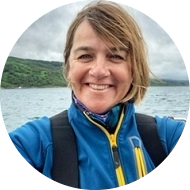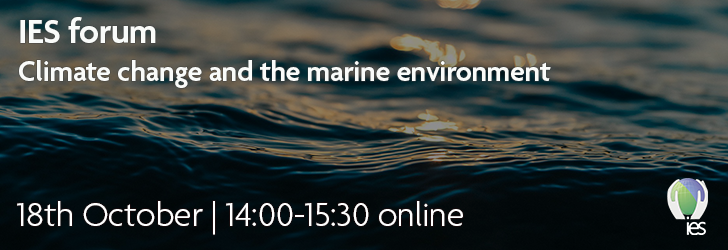The ocean and the climate are inextricably linked and anthropogenic climate change is having profound impacts on the marine environment. This forum will explore the impact of climate change on the ocean to date, how it is measured and the role of the ocean in climate adaptation.
We will be joined by three expert speakers presenting on the following topics:
- Climate change impacts on the ocean: What do we know and how do we measure it? Katy Hill, UK G7 Marine Science Coordinator
While the ocean might be considered distant from our day to day lives, it touches on every part of it. From the food on our plate, to the oxygen we breathe, to the weather we experience. The ocean also plays a central role in our climate system. It has taken up over 90% of the excess heat trapped in our climate system and over 25% of carbon. How it absorbs, stores and redistributes these properties has big impacts on our climate, as well as on ocean ecosystems. Climate change is leading to issues in the marine environment such as ocean acidification, ocean de-oxygenation and shifts in the ranges of species. Advances in our ability to measure the ocean in recent years means we have made great gains in our understanding of the role of the ocean in climate. This talk will give an overview of ocean climate impacts, the developments in how we measure the ocean - including exciting new technological advances - and will look to the future in terms of how we develop the observing system and digital tools to support decision-making related to managing and protecting our marine environment. The talk will also cover the international structures and mechanisms which have enabled a global collaboration to measure, understand and predict our ocean – and to inform international decision-making.
- Nearly 20 years of the Marine Climate Change Impacts Partnership (MCCIP) in nearly 20 minutes… Paul Buckley, Principal Scientist
Since 2005, MCCIP has provided an impartial community view on UK coastal and marine climate change issues. Hundreds of leading scientists have volunteered to write MCCIP peer-reviewed papers on dozens of topics, from sea-level rise to seabirds, and temperature to transport. MCCIP also works with stakeholder communities, such as trade associations and conservations bodies, to assess risks and develop solutions. We recently dipped our toes into overseas waters, publishing the first ever assessment of climate change across the 14 UK overseas territories. In this talk, we will share our experience of working effectively across stakeholder groups and some of the key outcomes from our impacts and adaptation projects.
- Integrating climate change adaptation and biodiversity conservation in marine protected areas Derek Tittensor, Jarislowsky Chair in Marine Ecosystem Forecasting
The global network of marine protected areas is designed to help safeguard marine biodiversity from human impacts. However, climate change represents a challenge and a risk to both biodiversity and conservation measures. Derek will discuss these issues and how we can start to build a more climate-resilient protected area network.
Our speakers
 Paul Buckley is a principal scientist based at the Centre for the Environment, Fisheries and Aquaculture Science (CEFAS). He is the programme manager for the UK Marine Climate Change Impacts Partnership (MCCIP), which provides a unique interface between government, its agencies, scientists, industry, NGOs and the wider stakeholder community. He has played a lead role in many EU framework projects, including on public perception and ocean literacy, and has undertaken climate change risk assessments across the Caribbean, Pacific, Middle East and UK Overseas Territories.
Paul Buckley is a principal scientist based at the Centre for the Environment, Fisheries and Aquaculture Science (CEFAS). He is the programme manager for the UK Marine Climate Change Impacts Partnership (MCCIP), which provides a unique interface between government, its agencies, scientists, industry, NGOs and the wider stakeholder community. He has played a lead role in many EU framework projects, including on public perception and ocean literacy, and has undertaken climate change risk assessments across the Caribbean, Pacific, Middle East and UK Overseas Territories.
 Dr Katherine (Katy) Hill has over 20 years of professional experience in marine and climate science, working at national, international and intergovernmental levels, particularly focusing on the science to policy interface, and the case for investment in sustained ocean observations, data and prediction infrastructure. Katy is the UK G7 Marine Science Coordinator and Co-Leads the G7 Future of the Seas and Oceans Initiative (G7 FSOI) Coordination Centre. Previously Katy worked for the Global Climate Observing System (GCOS) and the Global Ocean Observing System (GOOS). Katy is also a Visiting Fellow at the University of Southampton and mentors students working at the interface between ocean science-policy and international relations.
Dr Katherine (Katy) Hill has over 20 years of professional experience in marine and climate science, working at national, international and intergovernmental levels, particularly focusing on the science to policy interface, and the case for investment in sustained ocean observations, data and prediction infrastructure. Katy is the UK G7 Marine Science Coordinator and Co-Leads the G7 Future of the Seas and Oceans Initiative (G7 FSOI) Coordination Centre. Previously Katy worked for the Global Climate Observing System (GCOS) and the Global Ocean Observing System (GOOS). Katy is also a Visiting Fellow at the University of Southampton and mentors students working at the interface between ocean science-policy and international relations.

Derek Tittensor is the Jarislowsky Chair in Marine Ecosystem Forecasting at Dalhousie University in Halifax, Canada. He works on issues around marine biodiversity, conservation, and ocean futures.
This event is free for IES members to attend, non-members are welcome to attend for a small fee of £25. A member of the IES team will contact you to organise payment.


